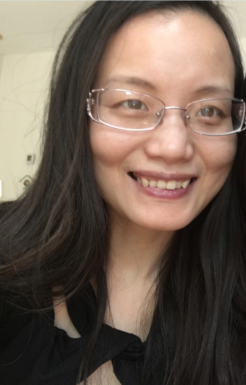
Qi Yang, M.D., Ph.D.
Associate Professor, Department of Pediatrics, Rutgers RWJMS
Resident Scientist, Rutgers Child Health Institute of New Jersey
Member, Rutgers Institute for Translational Medicine and Science
Rutgers Institute for Translational Medicine and Science
Child Health Institute of New Jersey
Rutgers, The State University of New Jersey
89 French Street
New Brunswick, NJ 08901
(732) 235-4501
qy117@rwjms.rutgers.edu
Education
Ph.D., University of Pittsburgh, Pittsburgh, PA, 2010
M.D., Tong Medical College, Wuhan, China, 2005
Dr. Yang is an Associate Professor in the Department of Pediatrics, Rutgers RWJMS. She is a resident scientist at Rutgers Child Health Institute of New Jersey and a member of Rutgers Institute for Translational Medicine and Science. Dr. Yang serves as a standing member in the NIH Lung Cellular Molecular Immunology (LCMI) study section. The goal of Dr. Yang’s lab is to understand the immune cell pathways and network in vital organs such as lung and brain at homeostasis and in inflammatory disorders, focusing on innate and innate-like lymphocytes.
Research Interests
Our research focuses on understanding the function and regulation of innate and innate-like lymphocytes in inflammatory disorders. We focus on asthma and cognitive impairment disorders. Unlike circulating blood-born immune cells, a group of immune cells reside in non-lymphoid tissue such as various vital organs. Many of these immune cells possess innate or innate-like functional properties, although their ontogeny and function remain to be better characterized. These tissue-resident immune cells are capable of constitutively secreting various effector molecules, thus altering the surrounding microenvironment and influencing tissue homeostasis and organ function. Innate and innate-like lymphocytes are unique subsets of lymphocytes that are enriched in non-lymphoid tissues. Unlike traditional adaptive lymphocytes, innate/innate-like lymphocytes are primed for rapid activation upon specific or non-specific stimulation, and many of them are constitutively producing effector molecules even at homeostasis. Our lab has revealed complicated crosstalk among innate lymphoid cells, innate-like T cells, and adaptive lymphocytes in asthma. We have also performed pioneer work to explore function and regulation of innate lymphoid cells in the brain barriers. Our goal is to unmask the immune cell network in the lung and in the brain barriers, to reveal the interaction between immune and no-immune cells in the tissue, and to reveal the essential drivers and regulators of asthma and cognitive impairment diseases. Current projects include:
Current Projects
- Investigating the function and regulation of lung-resident innate and innate-like lymphocytes in asthma, especially severe steroid resistant asthma.
- Investigating the role of innate and innate-like lymphocytes in regulating brain homeostasis and cognitive function.
Selected publications
- Adventitial stromal cells and myofibroblasts recruit pro- and anti-inflammatory immune cells in allergic airway inflammation. Allergy. 2023 May 12. PMID: 37171245 DOI: 10.1111/all.15766
- Mucosal associated invariant T cells restrict reactive oxidative damage and preserve meningeal barrier integrity and cognitive function. Zhang Y, Bailey JT, Xu E, Singh K, Lavaert M, Link VM, D’Souza S, Hafiz A, Cao J, Cao G, Sant’Angelo DB, Sun W, Belkaid Y, Bhandoola A, McGavern DB, Yang Q., Nature Immunology (2022). https://doi.org/10.1038/s41590-022-01349-1. PMID: 36411380
- Type I Interferon signaling controls the accumulation and transcriptomes of monocytes in the aged lung. D’Souza SS, Zhang Y, Bailey JT, Fung ITH, Kuentzel ML, Chittur SV, and Yang Q. Aging Cell; 2021 Sep 21; e13470. doi: 10.1111/acel, online ahead of print; 2021. PMID: 34547174. PMCID: PMC8520712 .
- Group 2 innate lymphoid cells are numerically and functionally deficient in the triple transgenic mouse model of Alzheimer’s disease. Fung ITH, Zhang Y, Shin DS, Sankar P, Sun X, D’Souza SS, Song R, Kuentzel ML, Chittur SV, Zuloaga KL, and Yang Q. J Neuroinflammation; 18(1):152; 2021. PMID: 34229727. PMCID: PMC8261980.
- Depletion of NK Cells Improves Cognitive Function in the Alzheimer Disease Mouse Model. Zhang Y, Fung ITH, Sankar P, Chen X, Robison LS, Ye L, D’Souza SS, Salinero AE, Kuentzel ML, Chittur SV, Zhang W, Zuloaga KL, and Yang Q. J Immunol. 205(2):502-510; 2020. PMID: 32503894. PMCID: PMC7343613.
- Activation of group 2 innate lymphoid cells alleviates aging-associated cognitive decline. Fung ITH, Sankar P, Zhang Y, Robison L, Zhao X, D’Souza SS, Salinero AE, Wang Y, Qian J, Kuentzel ML, Chittur SV, Temple S, Zuloaga KL, and Yang Q. J Exp Med; 217(4):e20190915; 2020. PMID: 32022838. PMCID: PMC7144523.
- Mucosal associated invariant T cells restrict allergic airway inflammation.Ye L, Pan J, Pasha MA, Shen X, D’Souza SS, Hin Fung IT, Wang Y, Guo B, Tang DD, and Yang Q. Journal of Allergy and Clinical Immunology;145(5):1469-1473; 2020. PMID: 31874183. PMCID: PMC7214121.
- A critical role for c-Myc in group 2 innate lymphoid cell activation. Ye L, Pan J, Liang M, Pasha MA, Shen X, D’Souza SS, Fung ITH, Wang Y, Patel G, Tang DD, and Yang Q. Allergy. 75(4):841-852; 2020. PMID: 31833571. PMCID: PMC7176544.
- Compartmentalized effects of aging on group 2 innate lymphoid cell development and function. D’Souza SS, Shen X, Fung ITH, Ye L, Kuentzel M, Chittur SV, Furuya Y, Siebel CW, Maillard IP, Metzger DW, and Yang Q. Aging Cell. 18(6):e13019; 2019. PMID: 31429526. PMCID: PMC6826140.
- Blockade of IL-4Rα inhibits group 2 innate lymphoid cell responses in asthma patients. Patel G, Pan J, Ye L, Shen X, Rosloff D, D’Souza SS, Fung ITH, Celstin J, Sun W, Sankar P, Zhang Y, Pasha MA, Yang Q. Clin Exp Allergy. 2019 Oct 16. doi: 10.1111/cea.13514. PMID: 31621112. PMCID: PMC6994377.
